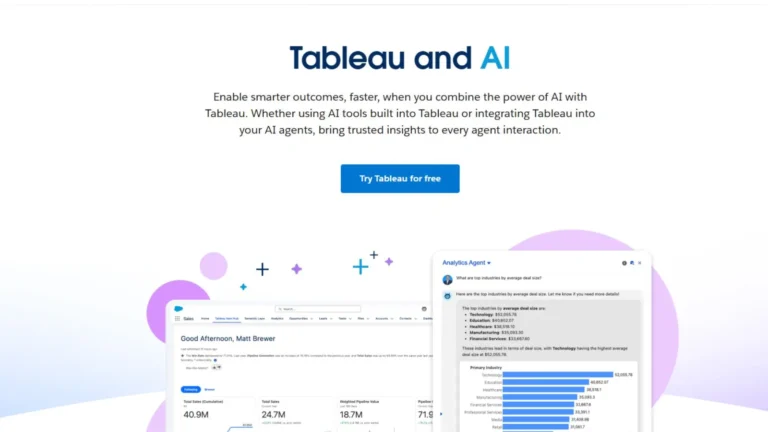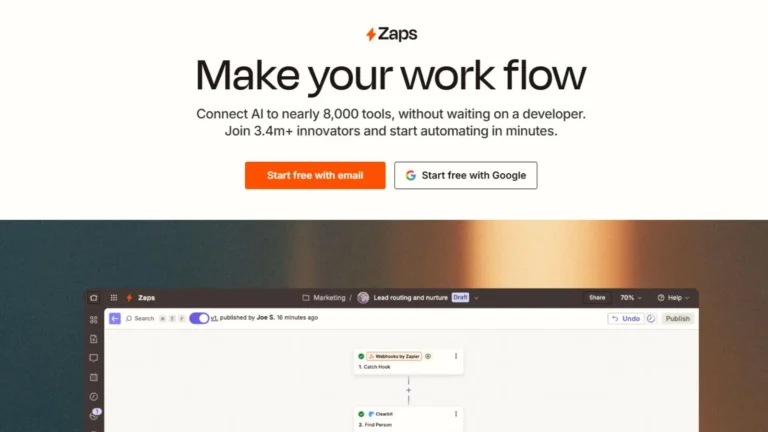What is Clevis?
AI applications have been the center of attention in today’s fast-evolving world of technology. Many businesses and creative projects are using AI applications as part of their systems. However, developing AI-powered tools requires much technical expertise, which makes it a challenging task for people who do not know how to code. Clevis is this new innovative application that bridges that gap by helping the user come up with, create, and then sell AI-enabled applications without any lines of codes written. Now, having experience on the site, I assure you that indeed, Clevis democratizes app development in the use of AI among entrepreneurs and small businesses with creatives now having an opportunity like never before to exploit AI.
What’s Offered?
Clevis is a no-code platform to be used by anybody who intends to design AI applications without the convolutions of conventional programming. It’s easy, intuitive, and includes pre-built functionalities, so bringing ideas to life quickly and efficiently is a matter of pure delight. Whether aspiring entrepreneur launching their first AI application or simply a small business that requires the unique solution, Clevis ensures everyone has equal accessibility, flexibility, and monetization capabilities.
The difference about this platform is that it simplifies the process and still provides robust functionality for AI.
With pre-built templates and smooth API integration, Clevis provides one-stop-shop solutions in making and selling AI-driven apps.
Key Features of Clevis
What made me explore more about Clevis was the success it presented in no-code development. Here’s a rundown on its core offers:
1. No-Code AI App Development
In its essence, Clevis is an application that helps users to build AI solutions without coding involved. It makes development easier by giving what are essentially processing chunks that can be refined to a desired level of granularity while preserving scalability. They can then use its easy to understand drag and drop features to build apps that can meet their needs.
2. Diverse Templates
Clevis has a baseline of templates to kick start the user as he or she develops. From an AI chatbot, image generator, or a tool that you wish to develop for data processing and analysis, these templates save time spent in the initial phase of creating the layout and provide an ideal structure for starting off.
3. Capability for Monetization
The monetization option is one of the main strengths of Clevis. Once you develop your app, you can sell them to other users via the platform and monetize your ideas as the apps you create. This shall be very helpful especially for the business people in providing subscription-based/note-forces AI based applications and tools to the people.
4. API Integration
Clevis enables your app to interact with other platforms through Application programming interface calls also. This makes it possible for your app to be called by HTTP requests, thus making the interrelation of the complementary systems possible – thus creating a smooth user experience.
5. Scheduling Functionality
The application development is partly automated nowadays, and Clevis is not an exception here. It also enables scheduling of operations of apps so that they can run on pre-set times that can make work automating very easy.
6. Customization Options
Clevis recognizes branding. You are therefore enabled to tailor your app’s color code in order to fulfill your brand identity or, so, ensure that your final outcome is professional and not inconsistent.
7. Data Management
For AI processing to be effective, there needs to be data so that Clevis lets its users upload their own data directly to the platform. This is an especially handy feature when coming up with personalized AI applications targeted toward specific datasets or business requirements.
Pros of Clevis
After spending time working with Clevis, I’ve come to appreciate several advantages that make it a standout platform for no-code AI app development:
1. Empowerment for Non-Technical Users
Clevis lowers the barrier to entry for AI app development, making it accessible to individuals without any coding knowledge. This democratization of technology is invaluable for entrepreneurs, small businesses, and creators who want to leverage AI without hiring expensive developers.
2. Deployment Time
With an intuitive interface and pre-built functionalities, Clevis has significantly reduced the time taken to develop and launch an app. What once took weeks or months may now be done in hours or days.
3. Revenue Streams
Clevis opens many doors for monetization by a creator. In building and selling AI-powered tools, users will be able to create new streams of revenue while scaling their business more effectively.
4. Versatility in Functionality
With the processing steps and features in Clevis, you can realize different use cases. Be it a chatbot, scheduling tool, or image generator, the tools are there for you to give life to your vision.
Downsides of Clevis
Even though Clevis is an innovation, the platform still lacks in some aspects as follows:
1. Fewer AI Models
Currently, Clevis has access to only a few AI models, which are only a couple, namely, ChatGPT and DALL-E. While these models are incredibly strong, more varieties in supported models will make this platform even more diverse and interesting to users in wider masses.
2. Learning Curve
Although the app doesn’t encourage programming, which requires learning something entirely new about its functionality or effectiveness, people are going to require time finding how best to leverage Clevis in the absence of code for coding.
3. Credit-based System
It operates on a credit-based system that may imply detailed planning to avoid overspending on applications. The user might need to observe their usage in order to top up or balance credits so as to spend accurately.
Conclusion
It has become a revolutionary platform for no-code AI app development that provides several aspects influencing the platform’s accessibility and profitability. Thus, It is democratizing AI technology and opening a new set of doors for business and other entities that before could not implement these solutions due to technical barriers. Its disadvantage is its reliance on credit-based model and it provides only some number of AI models.
However, the advantages of a polyandrous system outweigh the disadvantages noted herein above. Whether an entrepreneur is looking to build a customized solution, a small business owner is seeking automation of tasks, or a creative individual has an innovative idea that can be the next big thing, It provides the necessary tools to become a success in AI-powered apps.




